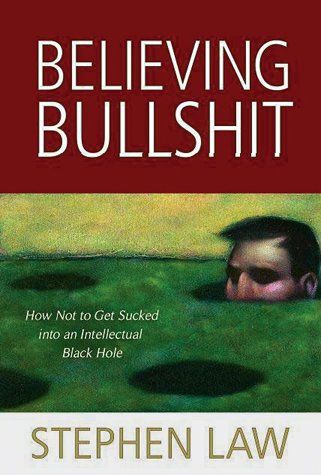
First, a credulity test. Do you believe the Bible foretold the assassination of John F. Kennedy? Or that 9/11 was a Jewish conspiracy? Or that, despite the fossil record, the world is less than 10,000 years old?
If so, the news is bad. Chances are you've tumbled into "an intellectual black hole," the favored term of British philosophy professor Stephen Law for a mental accident that's dangerously common and is "capable of sucking people in and holding them captive so they become willing slaves of claptrap." Your wacky belief may seem reasonable to you; be assured, it isn't.
Now, the good news. Law's latest work, Believing Bullshit, sets out a spotter's guide to the standard techniques of intellectual quackery, to help the unwitting among us.
It's important work. Citizens of the 21st century may be better educated than their forebears, but they're no less ready to drop their intellectual defenses when it comes to, say, the healing powers of crystals or stories of alien abduction. Says Law: "I have become more and more concerned over the last 10 years by the extent to which even intelligent, even college-educated people can end up being sucked into these little black holes of absurdity."
When even world leaders are susceptible, the potential consequences are scary—especially if they have access to the nuclear trigger. Law points out that Ronald Reagan accepted an astrologer's advice during his time in the White House and George W. Bush took America to war in Iraq on the basis of what he believed to be God-given intuition. "Maybe the biggest worry is that this kind of bullshit may ultimately bring about the end of the world."
So how do we strengthen our skeptical skills? Some of Law's prescriptions are simple. Beware, for example, the language of "Pseudo-profundity." Any references to vague "forces," "energies," or "balances" should ring loud alarm bells. Be alert for "Playing the Mystery Card," the practice of appealing to a mystery that defies science. Or the "I Just Know" mechanism, which rests on the assertion that a belief has been revealed by "some sort of psychic or god-sensing faculty." Watch out, too, for the "Pressing Your Buttons" method, typical of cults and totalitarian regimes, which depend on control, repetition, or emotional manipulation to win over adherents.
While one may come away from Believing Bullshit feeling a bit guilty for indulging in that lucky rabbit's foot, it helps that Law is no ponderous academic with an obscure vocabulary. This is a philosopher who likes mountain climbing and playing the drums in a rock band. A high-school dropout—"asked to leave at 17"—Law spent seven years working as a postman and a sandblaster before a fascination with the big questions of philosophy drove him back to college. "I did a lot of reading; one book led to another and eventually I found I was reading nothing but philosophy books. Finally it occurred to me that this was something you could study at university."
Happily, the authorities at London's City University overlooked his absence of formal qualifications, a decision vindicated by Law's rapid success. Within a few years Law was teaching at Oxford, and at age 36 he was professor of philosophy at Heythrop College, part of London University.
Law thinks that an early grounding in philosophy can be of critical importance. He's produced two jargon-free primers called The Philosophy Files, which help schoolchildren think through some of the trickiest of big philosophical issues. (The most popular question with kids, according to Law, is whether it's right to eat meat—though "Where does the universe come from" is also a strong contender.) Too often, education today leaves kids vulnerable, he says. "It just equips people to accept what they are told and regurgitate it, so they don't have robust intellectual defenses. And if you don't have robust intellectual defenses then people are going to take advantage of you. It seems to me that every child should have some immunity to bullshit built into their upbringing."
Uncommon Knowledge
Newsweek is committed to challenging conventional wisdom and finding connections in the search for common ground.
Newsweek is committed to challenging conventional wisdom and finding connections in the search for common ground.
About the writer
To read how Newsweek uses AI as a newsroom tool, Click here.








